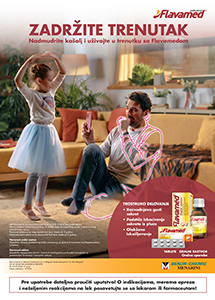IMPORTANCE OF TYPED BLOOD DONOR REGISTER IN FETAL AND NEONATAL TRANSFUSION CLINICAL PRACTICE
Keywords:
typed blood donors, hemolytic disease of the fetus and newborn, intrauterine transfusionAbstract
Typed donors registry effectively facilitates and significantly accelerates the finding of an adequate unit of blood for patients with multiple clinically significant antibodies, but it is also of great importance for the preparation of an adequate unit of blood for intrauterine transfusions in hemolytic disease of the fetus. The registry is particulary important when hemolytic disease of the fetus is caused by immunization with one of the antigens of very high frequency in the population. In registries, there are usually three types of donors: negative for high frequency antigens, negative for more common antigens, and donors with IgA deficiency. Considering the need to provide adequate and timely transfusion therapy for patients with multiple red cell antibodies and/or antibodies to high-frequency antigens, and with the aim of enabling the preparation of a blood unit for intrauterine transfusion from a regular donor, the Blood Transfusion Institute of Serbia for the first time in 2012 started planning activities on the formation of the Register of Typed Blood Donors. Hemolytic disease of the fetus and newborn (HBFN) is a serious complication of pregnancy due to maternal alloimmunization to paternally inherited fetal red cell antigens, leading to fetal erythrocyte hemolysis and anemia. Untreated, progressive fetal anemia can lead to hepatosplenomegaly, cardiomegaly, cardiac decompensation, and ultimately fetal hydrops and perinatal death. According to published data a large number of red cell antibodies can lead to severe forms of HBFN. Antibodies associated with severe HBFN are mainly against antigens of the Rh system, primarily against antigen D. The severe form of HBFN is occasionally caused by other anti-Rh antibodies as well as antibodies to Kell antigens, and less often by antibodies to antigens of other blood corpuscle systems (Duffy , Kidd and MNS). Alloantibodies against more than 50 non-ABO antigens can lead to HBFN, and many red cell antigens are retroactively first identified after the birth of an infant with hydrops. It is importante to form a registry of typed donors in each country, and facilitate the communication between registries, in order to provide the appropriate blood units for severe forms of hemolytic disease of the fetus and newborn caused by rare antibodies or a combination of antibodies would be timely and possible easily.
References
Frey BM, Fischer G. Data collection and data sharing - the holy gral of transfusion medicine and modern bioscience. Transfus Med Hemother. 2014 Oct;41(5):336-7. doi: 10.1159/000368123.
Dajak S, Ipavec N, Cuk M, Golubic Cepulic B, Mratinovic-Mikulandra J, Milardovic J, Stefanovic V. The Outcome of Hemolytic Disease of the Fetus and Newborn Caused by Anti-Rh17 Antibody: Analysis of Three Cases and Review of the Literature. Transfus Med Hemother. 2020 Jun;47(3):264-271. doi: 10.1159/000503012.
Flickinger C. REGGI and the American Rare Donor Program. Transfus Med Hemother. 2014 Oct;41(5):342-5. doi: 10.1159/000366149.
Nance ST. How to find, recruit and maintain rare blood donors. Curr Opin Hematol. 2009 Nov;16(6):503-8. doi: 10.1097/MOH.0b013e3283316bed.
Revelli N, Villa MA, Paccapelo C, Manera MC, Rebulla P, Migliaccio AR, Marconi M; Members of the Lombardy Rare Donor Programme. The Lombardy Rare Donor Programme. Blood Transfus. 2014 Jan;12 Suppl 1(Suppl 1): s249-55. doi: 10.2450/2013.0182-12.
Hurley CK, Oudshoorn M, Setterholm M. Donor registries and search strategies. Methods Mol Biol. 2012; 882:531-47. doi: 10.1007/978-1-61779-842-9_30.
Moise KJ. Fetal anemia due to non-rhesus-D red-cell alloimmunization. Semin Fetal Neonatal Med. 2008; 13:207–214. Epub2008/04/09.
Hendrickson Jeanne E.; Delaney Meghan, Hemolytic Disease of the Fetus and Newborn: Modern Practice and Future Investigations, Transfusion Medicine
Reviews (2016), doi: 10.1016/j.tmrv.2016.05.008.
Reid ME, Lomas-Francis C. The Blood Group Antigen Facts Book. 2nd ed. Amsterdam: ElsevierAcademic Press; 2004.
Eder AF. Update on HDFN: new information on long-standing controversies. Immunohematology. 2006;22(4):188-95. PMID: 17430078.
Moise KJ Jr. Non-anti-D antibodies in red cell alloimmunization. Eur J Obstet Gynecol Reprod Biol. 2000 Sep;92(1):75-81. doi: 10.1016/s0301-2115(00)00428-0.
Heathcote DJ, Carroll TE, Flower RL. Sixty years of antibodies to MNS system hybrid glycophorins: what have we learned? Transfus Med Rev. 2011 Apr;25(2):111-24. doi: 10.1016/j.tmrv.2010.11.003.
Pate LL, Myers JC, Palma JP, Viele M, Galel SA, Ferrer Z, Gonzalez CL, Benitz WE, Garratty G, Fontaine MJ. Anti-Ge3 causes late-onset hemolytic disease of the newborn: the fourth case in three Hispanic families. Transfusion. 2013 Oct;53(10):2152-7. doi: 10.1111/trf.12027.
Mimura K, Endo M, Takahashi A, Doi Y, Sakuragi M, Kiyokawa T, Taniguchi H, Kitabatake Y, Handa M, Tomimatsu T, Tomiyama Y, Isaka Y, Kimura T. Successful management of fetal hemolytic disease due to strong anti-Rh17 with plasma exchange and intrauterine transfusion in a woman with the D-- phenotype. Int J Hematol. 2020 Jan;111(1):149-154. doi: 10.1007/s12185-019-02735-6.
Virk M, Papakonstantino K, Cai W, Oh D, Andrews J. Blood Donation During Pregnancy Due to Anti-Ku Hemolytic Disease of the Fetus and Newborn. Lab Med. 2019 Oct 10;50(4):421-425. doi: 10.1093/labmed/lmz020.
Moise KJ Jr, Argoti PS. Management and prevention of red cell alloimmunization in pregnancy: a systematic review. Obstet Gynecol. 2012 Nov;120(5):1132-9. doi: 10.1097/aog.0b013e31826d7dc1.
American College of Obstetricians and Gynecologists. ACOG Practice Bulletin No. 75: Management of alloimmunization during pregnancy. Obstet Gynecol. 2006 Aug;108(2):457-64. doi: 10.1097/00006250-200608000-00044.
Osanan GC, Silveira Reis ZN, Apocalypse IG, Lopes AP, Pereira AK, da Silva Ribeiro OM, Vieira Cabral AC. Predictive factors of perinatal mortality in transfused fetuses due to maternal alloimmunization: what really matters? J Matern Fetal Neonatal Med. 2012 Aug;25(8):1333-7. doi: 10.3109/14767058.2011.633668.
Schonewille H, Klumper FJ, van de Watering LM, Kanhai HH, Brand A. High additional maternal red cell alloimmunization after Rhesus- and K-matched intrauterine intravascular transfusions for hemolytic disease of the fetus. Am J Obstet Gynecol. 2007 Feb;196(2):143.e1-6. doi: 10.1016/j.ajog.2006.10.895.
Schonewille H, Prinsen-Zander KJ, Reijnart M, van de Watering L, Zwaginga JJ, Meerman RH, van Kamp IL, Brand A. Extended matched intrauterine transfusions reduce maternal Duffy, Kidd, and S antibody formation. Transfusion. 2015 Dec;55(12):2912-9; quiz 2911. doi: 10.1111/trf.13231.





